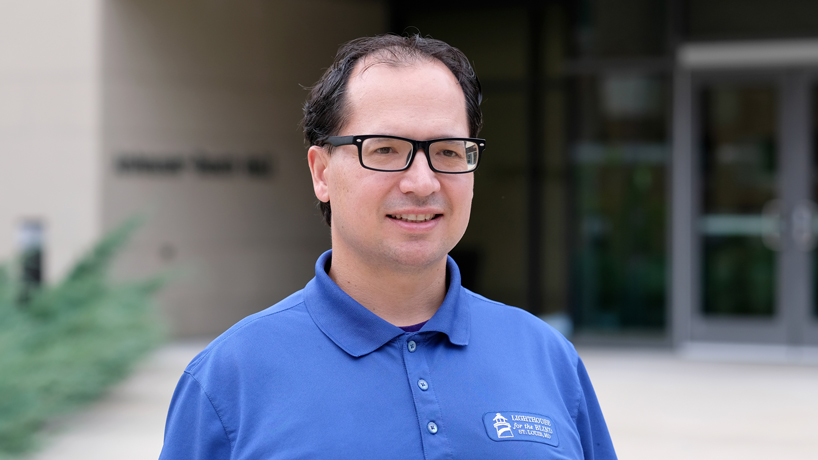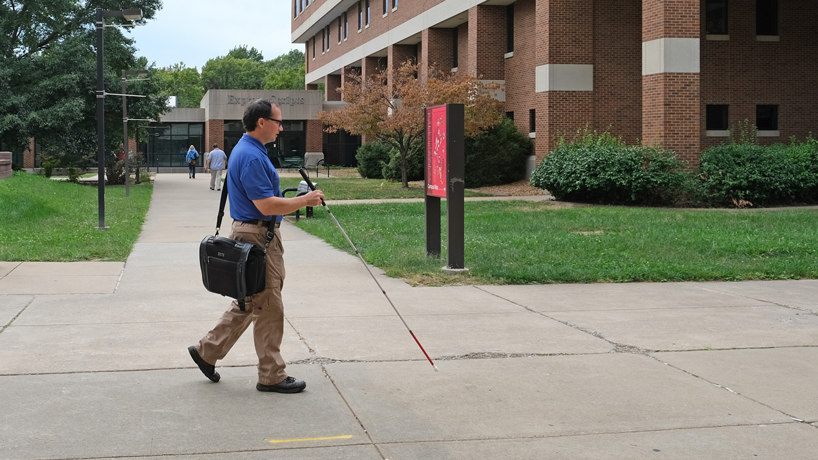
National Industries for the Blind named UMSL MBA student Elton Thomas the 2019 recipient of the Milton J. Samuelson Award earlier this year. The award is presented to individuals who demonstrate career advancement at an NIB-associated nonprofit agency or in the private sector. (Photos by August Jennewein)
There are a lot of ways Elton Thomas might have chosen to label himself on his LinkedIn profile.
He could have said he was a production supervisor at Lighthouse for the Blind–St. Louis – a nonprofit manufacturer with a mission to assist legally blind individuals through employment opportunities, education and support services.
He could have said he was an MBA student at the University of Missouri–St. Louis, on track to finish his degree in May.
He also could have said he was the recipient of the 2019 Milton J. Samuelson Career Achievement Award, an honor conferred by National Industries for the Blind to recognize blind individuals who demonstrate career advancement at an NIB-associated nonprofit agency or in the private sector.
But none of those describes Thomas as thoroughly as his own chosen handle: “Advocate for Success.”
That title is an acknowledgement of the work he has done trying to advance the interests of blind people as part of NIB’s Advocates for Leadership and Employment program and also is an apt description of the way Thomas has approached his own career.
“He simply seizes every opportunity to better himself and then applies what he learns in his position at the Lighthouse to improve our performance,” Lighthouse St. Louis President John Thompson said of Thomas in a news release announcing the Samuelson Award in May.
Thomas landed his first job at The Lighthouse 16 years ago, not long after graduating high school from the Missouri School for the Blind.
He starting working as a machine operator, controlling three switches and filling soap – six gallons at a time – at a facility in Overland.
Thomas didn’t spend long in that role before he got reassigned to the Berkeley facility as a production coordinator on two of the aerosol lines.
In 2006, The Lighthouse sent him to business management training in Washington through the Darden School of Business at the University of Virginia. By 2012, Thomas had been promoted to supervisor.
“It’s pretty fascinating what we do,” said Thomas, who oversees a team of at least 25 people. “We have a lot of machines, hazardous chemicals, flammable chemicals and a lot of blind people doing the work. Under AbilityOne, our labor force has to be 75 percent or higher legally blind, and we’re, I believe, a little over 90 percent. Outside of four truck drivers, everyone else is pretty much blind or legally blind.”
He started taking on more and more responsibility with all the lines of production, soap and aerosols alike. He recognized that further advancement was going to take more education, so in 2013, Thomas enrolled in an accelerated, online-only program through Ashford University and went on to earn his bachelor’s degree in business in 2016.
Elton Thomas walks through the Quad on his way to class one evening earlier this semester. Thomas’ daily commute includes a MetroLink ride through the UMSL campus. When he was contemplating going back to school to get a master’s degree two years ago, UMSL offered a convenient option, and he’s glad he made the decision to enroll.
One might have forgiven Thomas had he opted to let life slow down for a while after taking 18 credit hours a semester in pursuit of his undergraduate degree. He had enough to occupy him after purchasing his first house in south St. Louis.
Instead, while researching the job market, Thomas pretty quickly found himself toying with the idea of returning to school again to enhance his resume.
“Maybe I’ll just go and get my MBA,” he remembered thinking.
His daily commute only reinforced that idea.
Thomas relies on public transportation to get to and from work, and his itinerary includes time on two bus rides and a MetroLink train that brings him through the UMSL campus every day.
“I just kept thinking, ‘You know, I could easily just get off here, take a class or two and then go home later each night,’” Thomas said.
He paid a visit to the College of Business Administration right as Anheuser-Busch Hall was in the finishing stages of construction. He got to witness it being painted.
Thomas met with an advisor, liked what he heard and wound up enrolling in the Flex MBA program in the fall of 2017.
“It’s been going great,” Thomas said. “I love all my classes. The professors have been wonderful.”
Thomas has enjoyed the flipped format of many of his classes, where his professors put their lectures online and work through homework problems in the classroom.
It’s helped that he also has been able to see how the things he’s been learning apply toward his job.
Juggling work and school has required exceptional time management from Thomas, but UMSL’s done its part to make everything accessible.
“I’ve been able to get all my textbooks and all the materials electronically,” he said. “That allows me to listen to them on the bus on the way to or from work.”
Thomas is eager for the days when he doesn’t always have to do that type of multitasking. That will free his schedule up for other activities, including his advocacy work.
He came to that role somewhat reluctantly a decade ago after being encouraged to get involved by connections at the Missouri Council of the Blind. They told him about a bill aimed at addressing the problem of publishing companies not getting textbooks to blind students in audio or large-print formats in too many cases until the end of a semester, putting them at a significant disadvantage.
It reminded him of his own experience as a child. Doctors discovered damage to Thomas’ eyes shortly after birth, but his vision deteriorated over time, and he was not deemed to be legally blind until he was a teenager. He had difficulty getting resources at the school he attended in Festus.
“I was in middle school, and they were not equipped to give me what I needed,” said Thomas, whose best acuity today is 20/400. “The best decision at the time for me, when I was 13, was to move away from home and live in the dorm at the School for the Blind, so I could get a decent education. I guess it kind of hit home to me, and I got involved.”
He eventually got involved with the NIB public advocacy forum and makes annual trips to Washington to meet with elected officials and discuss challenges facing blind individuals. He typically discusses those efforts with his co-workers during quarterly meetings at The Lighthouse.
One issue that’s been a focus lately is the so-called Social Security Disability Insurance cash cliff affecting workers with disabilities. Those individuals are incentivized to stop work or be underemployed or risk losing benefits they need because they exceed existing earnings limits.
“I wouldn’t say it’s a dream job, but it serves a purpose,” he said of being an advocate. “There are clear and common-sense things that that could make so many people’s lives easier. It just makes so much sense on both sides. Removing these types of caps, you’re going to create more taxpayers. You’re going to create people who are going to be working off of welfare and eventually hopefully not getting welfare anymore, freeing up more money in tax revenue. It is rewarding.”















